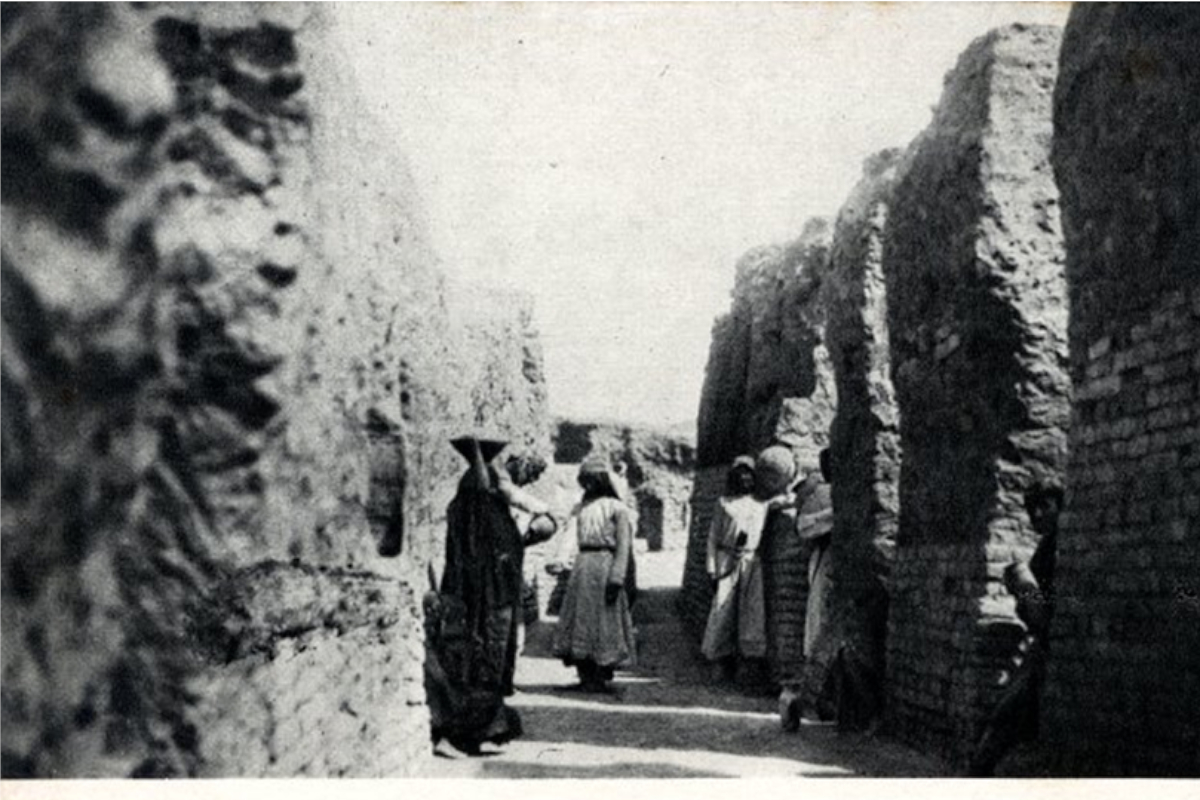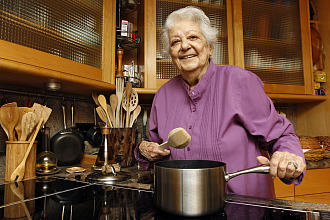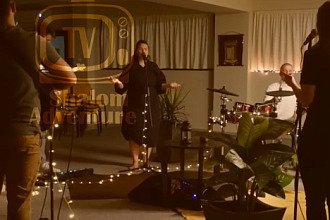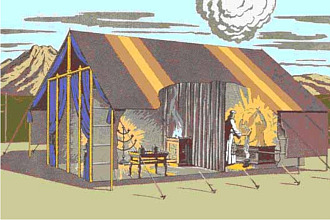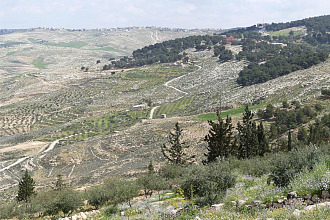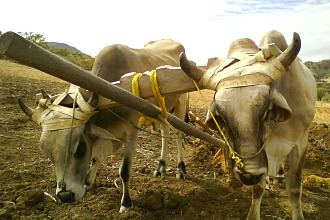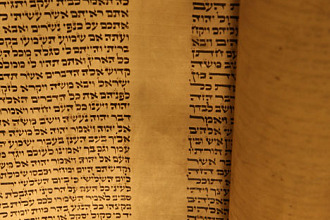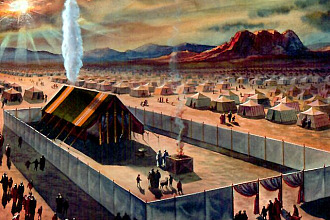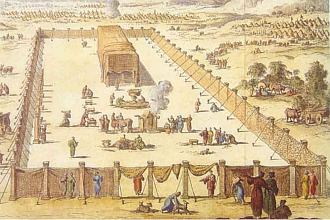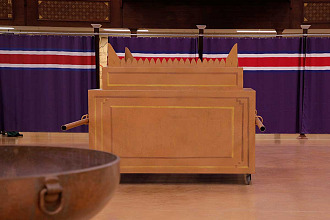Parasha for the Week: Lech Lecha Genesis 12:1 - 17:27.
Haftarah for the Week: Isaiah 40:27 - 41:16.
Apostolic Writings: Acts 7.
Overview
Ten generations have passed since Noach. Man has descended spiritually.
In the year 1948 from Creation, Avram is born. By observing the world, Avram comes to recognize G-d's existence, and thus merits that G-d appear to him.
At the beginning of this weeks Torah portion G-d tells Avram to leave his land, his relatives and his father's house and travel to an unknown land where G-d will make him into a great nation.
Avram leaves, taking with him his wife Sarai, his nephew Lot, their servants, and those whom they converted to faith in G-d.
When they reach the land of Canaan, G-d appears to Avram and tells him that this is the land that He will give to his descendants.
A famine ensues and Avram is forced to relocate to Egypt to find food. Realizing that his wife's beauty would cause his death at the hand of the Egyptians, Avram asks her to say that she is his sister. Sarai is taken to Pharaoh, but G-d afflicts Pharaoh and his court with severe plagues and she is released unmolested.
Avram returns to Eretz Yisrael (Canaan) with much wealth given to him by the Egyptians.
During a quarrel over grazing rights between their shepherds, Avram decides to part ways with his nephew Lot.
Lot chooses to live in the rich but corrupt city of Sodom in the fertile plain of the Jordan. A war breaks out between the kings of the region and Sodom is defeated. Lot is taken captive.
Together with a handful of his converts, Avram rescues Lot, miraculously overpowering vastly superior forces, but Avram demurs from accepting any of the spoils of the battle.
In a prophetic covenant, G-d reveals to Avram that his offspring will be exiled to a strange land where they will be oppressed for 400 years, after which they will emerge with great wealth and return to Eretz Yisrael, their inheritance.
Sarai is barren and gives Hagar, her Egyptian hand-maiden, to Avram in the hope that she will provide them with a child.
Hagar becomes arrogant when she discovers that she is pregnant. Sarai deals harshly with her, and Hagar flees.
On the instruction of an angel Hagar returns to Avram, and gives birth to Yishmael.
The weekly portion concludes with G-d commanding Avram to circumcise himself and his offspring throughout the generations as a Divine covenant.
G-d changes Avram's name to Avraham, and Sarai's name to Sarah. Hashem promises Avraham a son, despite Avraham being ninety-nine years old and Sarah ninety.
On that day, Avraham circumcises himself, Yishmael and all his household.
Ten Generations Between Noach and Abraham
Ten generations have passed since Noah. Spirituality and ethics of this generation were at the lowest level. Again 10 generations after Hashem intervention, humanity has not drawn a lesson from what happened in the past. At the time of the flood, seeing the failure of human beings, Hashem decided to annihilate all humanity from the earth. Now, 10 generations after Noah, the assessment is again negative, and it is clear that to start a new humanity is not the solution, thus, Hashem decides to start a new group, which will be his own people, and then he will give to this people all what they need to be faithful to Him.
Abram: First to be Called Prophet of G-d
With Abraham a new chapter of human history starts. As it is said in the Jewish tradition, the world has to last for six thousand years; the first two thousand were years of chaos. Then the next two thousand years are years of Torah, and the last two thousand years are the years of the Messiah. The second two thousand years, years of Torah start with Abraham. That is why we believe that now a new story is starting. The failure of Adam and his successive generations and the failure of Noah and his successive generations, demonstrate that as Noach was a new Adam. Abraham is somehow also a new Adam. All the families of the earth would be blessed through him, and today the three main monotheist religions -- Judaism, Christianity ,and Islam -- claim Abraham as their father. In the Jewish tradition, in this sense, Abraham is the new ancestor, the new father of humanity, a humanity in search of God.
According in the year 1948 from Creation that Avram was born. By observing the world, Avram comes to recognize God’s existence, and God appears to him and tells him that he will be the first man in history to be called a prophet of God.
Lech Lecha
At the beginning of this week’s Torah portion, God tells Avram to leave his land, his relatives and his father’s house and travel to an unknown land where God will make him into a great nation. The name of the Parashah comes from the first verse of our section, “Then Hashem said to Abram, “Get going out [Lech-Lecha] from your land, and from your relatives, and from your father’s house, to the land that I will show you” (Genesis 12:1). It is a strange order, because when one’s wants to say to somebody “Go,” the Hebrew order should be Lech; we can add the preposition “le” to the next word, which is supposed to be a destination. “Le” is the equivalent of the English “to” in order to specify where to “go.” For example the expression, “lech leparis” would mean “Go to Paris.” But the expression lech lecha is very unusual. This very expression Lech Lecha is used in the whole Bible only two times and in connection with Avraham. First in Genesis 12 when he has to leave Charan and second in Genesis 22:2 when Avraham received the order to go to Moriah to offer his son Itczhak as a burn offering. The expression Lech Lecha means literally “Go for (or to) yourself.” It is an expression which invite the recipient to go to his own mind, to go to isolation, to separate himself from others, go to an introspection. That is why Rabbi Hirsch translate this expression by a paraphrase “Go for yourself, go your own way, go the way that will isolate you from your land from your birth place, and from your father’s house—from all your previous connection.”
A question Jewish scholars asked about this text, is: “why does the Torah use the words Lech-Lecha which literally means “go for yourself” when only the word Lech “go” would have been enough? Rashi tries to explain that God is telling Avraham that -- although this commandment may seem difficult at this time -- it is in fact, “for your benefit and for your pleasure” that you will make this trip. Lech-Lecha is an invitation to a spiritual journey. This is the command given to everybody at one time of his life. A command to consider entering a new life, a spiritual life in order to find God. Go-to-yourself means depart from your comfort zone, comfort life to an unknown journey, maybe an alien place in a spiritual journey in order to discover your true self and the purpose of God for you and your life. It is only when you will find the true purpose of your life, you will fulfill your mission on the earth.
HAFTARAH Isaiah 40:27 - 41:16
The book of Isaiah is a very beautiful text. This prophet was a real poet and our text of this week is a wonderful poem (Isaiah 40:28). "Have you not known? Have you not heard? The LORD is the everlasting God, the Creator of the ends of the earth.”
The God of Israel is an everlasting God with an everlasting love for his children. Here we have the link between the Parahsa and this Haftarah; both of them are about Abraham who left his home to respond to the calling of God (Isaiah 41:8-10).
But you, Israel, my servant, Jacob, whom I have chosen, the offspring of Abraham, my friend; you whom I took from the ends of the earth, and called from its farthest corners, saying to you, "You are my servant, I have chosen you and not cast you off"; Fear not, for I am with you, Be not frightened, for I am your God; I strengthen you and I help you, I uphold you with My victorious right hand.
Apostolic Writings: Acts 7
In the Apostolic writings or Apostolic Writings, we have a very interesting book which gives us a lot of information about the history of the Jewish people in the first century. In chapter 7 we discover that all the believers in Yeshua are Jewish, and all the stories for the last three years are located in Jerusalem, the Holy city of the people of Israel. In this chapter, we have a speech given by Stephen, one of the last leaders ordained by the 12 talmidim of Yeshua. In the previous chapter we have a description of his smichut “ordination:” “they chose Stephen, a man full of faith and the Ruach ha-Kodesh, and Philip, Prochorus, Nicanor, Timon, Parmenas, and Nicolas, a proselyte from Antioch. They placed these men before the emissaries; and after praying, they laid hands on them” (Acts 6:5–6). They all have Greek names because, until that time, the leaders of the new community were chosen in Israel, among Hebrew speaking believers, and since this new community had an international vocation, it was important now to balance the leadership and to appoint leaders coming from the diaspora. The Jewish people never hesitated to use local names even though most of them could have a Jewish name for the synagogue and religious opportunity.
The Talmidim of Yeshua made no distinction between those who were born in the land of Israel and those who were born in diaspora; they did not make any distinction between those born in a Jewish family or a Gentile family. What was important was that the new leaders were converted to the God of Israel; that is why among these new leaders was a new convert: “Nicolas, a proselyte from Antioch.” Nicolas was a Gentile who converted to Judaism, and for him, it was clear that after accepting Yeshua as the Mashiach, he did not change his religion; he was still a Jew. Indeed Yeshua was a Jew; thus everyone who believed in him was Jew.
One of these leaders who received the smichut through the talmidim of Yeshua was arrested by the Sanhedrin. It was one of the prerogatives of the Sanhedrin; they had no political power, but they were given all authority in Jerusalem on religious matters, in order to keep the city quiet and to prevent any riots from the activists who were not happy to see so many foreign soldiers in Jerusalem, the city of God. This leader was Stephen. Let’s remember that in Jerusalem were several synagogues; people were not only worshiping in the temples but also in synagogues. It was like today; we have the Kotel (Western wall), and close to it, several synagogues. Jews are coming from so many different countries that they have different liturgical traditions; an Ashkenaz does not worship in the same way as a Sephardic Jew.
Two thousand years ago, it was the same; many synagogues were built in Jerusalem to satisfy the various traditions of Jews. Thus we read “Now Stephen, full of grace and power, was doing great wonders and signs among the people. But some men from what was called the Synagogue of the Freedmen—both Cyrenians and Alexandrians, as well as some from Cilicia and Asia—stood up and began arguing with Stephen. But they could not withstand the wisdom and the Ruach by whom he was speaking” (Acts 6:8–10). Stephen was member of the foreign Jews who were living in Jerusalem. The members of this synagogue were: the “Freedmen” the “Cyrenians” the “Alexandrians,” as well as some from “Cilicia” and “Asia.” Even though Stephen was a strong believer in Yeshua, able to do great wonders, and miracles, he was member of the same synagogue of another Jew who was at that time in Jerusalem, Saul of Tarsus of Cilicia. We have his testimony: “I am a Jewish man from Tarsus in Cilicia.” (Acts 21:39). Stephen’s synagogue was also the synagogue of the people from Cilicia; thus Saul was present when Stephen defended his faith in Yeshua.
Since Saul was a persecutor of the new “sect,” he was not happy to hear this man speaking boldly, and reported him to the Sanhedrin. Thus the text of Acts says that he was falsely accused, “Then they secretly instigated men into saying, ‘We have heard him speaking blasphemous words against Moses and against God!’ They also incited the people, the elders, and the Torah scholars; and they rushed at Stephen, seized him, and led him away to the Sanhedrin. They set up false witnesses who said, ‘This man never stops speaking words against this holy place and the Torah. For we have heard him saying that this Yeshua haNatzrati will destroy this place and change the customs that Moses handed down to us’” (Acts 6:11–14). It could have been impressive for Stephen to be before these great men. Gamaliel was there, and the text adds, “Watching him intently, everyone who was sitting in the Sanhedrin saw that his face was like the face of an angel” (Acts 6:15).
It was the Kohen Gadol in person who wanted to investigate about him and about what he heard. “Then the kohen gadol said, ‘Are these things so?’” (Acts 7:1) Stephen defended himself by a special speech before the Sanhedrin of Jerusalem. He started his discourse saying “‘Brothers and fathers, hear me. The God of glory appeared to our father Avraham when he was in Mesopotamia, before he lived in Charan, and said to him, ‘Go out Lech Lecha from your land and from your kindred and go into the land that I will show you’” (Acts 7:2–3). His defense was full of respect: “Brothers and fathers,” even though we don’t agree with the leaders of God’s people, we have to remember that they have been chosen to be in these positions, and we must respect them. His defense became a sermon; he recalled the story of Israel to the Sanhedrin.
We learn several ideas from this speech. The home country of Avraham was Mesopotamia, and it is there that he received his first call. But even though Avraham was an adult and mature man, he still was dependent on his father; the respect for parents and ancestors was great. That is why he agreed to go with his father to Assyria, and stayed in Charan. The second point we learn is that, contrary to what the Jewish tradition says and describes, in the parasha portion he left Charan only after the death of his father. “And after his father died, God removed him from there into this land in which you are now living” (Acts 7:4). Even though Avraham was 75 years old, he was obedient to his father. He knew God’s order, but he obeyed his father and waited for the death of his father to leave Haran for Canaan. Verse 4 is clear about the new homeland of Avraham, “God removed him from there into this land in which you are now living.”
Avraham went to the country were Stephen and the Sanhedrin were living 2000 years ago. They were in Jerusalem. Nobody can deny that Jerusalem was a city located in the country God has given to Israel. It was in that country God commanded Israel to circumcise their children: “And he gave him the covenant of circumcision. And so Avraham became the father of Isaac, and circumcised him on the eighth day, and Isaac became the father of Yaakov, and Yaakov fathered the twelve patriarchs” (Acts 7:8). Avraham’s lesson is that we have to be faithful to God by keeping the fifth commandment, which requires honoring our parents. In the text that recounts the history of Abraham and his descendants, their bondage in Egypt was also announced: “But God spoke in this way, that his ‘descendants would be foreigners in a land belonging to others, and they would enslave and mistreat them for four hundred years” (Acts 7:6 ). It was not the intention of God that Egypt should belong to Israel. Egypt is described as “a land belonging to others;” thus they knew they would be only for in that land for a certain time. God added “But I will judge the nation they serve as slaves,’ God said, ‘and afterward they shall come out and serve Me in this place’” (Acts 7:7).

